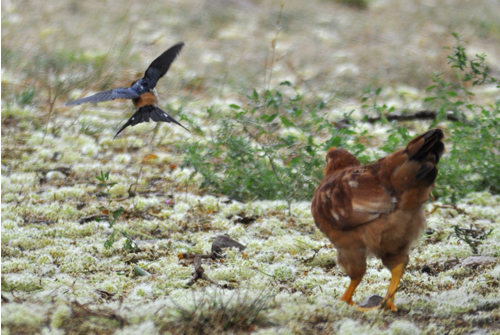Freedom Day, 16 December, brought much needed rain to the Klein Karoo and this corner of the Baviaanskloof. However, perhaps not all appreciated this gift from nature. For a week or two prior to the rain a giant Belumbra tree had been flowering in our garden. The masses of cream racemes buzzed with the sound of insects, and these in turn were probably the reason for the daily presence of up to forty Greater-Striped Swallows, 10+ Rock Martins and the odd European and Lesser-Striped Swallows. The swallows would swoop below the arching branches of the Belumbra in an endless aerial ballet.
But on the day of the rain I was greeted with an unusual sight – perhaps twenty or more swallows perched on the ground below the tree. This was unusual from several points of view. Although it can be understood that the swallows needed to stop flying to stop their feathers becoming waterlogged, the birds are very clumsy on the ground. As such, if they were attempting to continue their search for insects this would have been difficult.
But more strange was that the birds must have been aware of the local cats. At least one low flying swallow had been taken from the air by an acrobatic cat during the previous week. As I watched one cat took two low flying swallows – my instinct to rescue greater than my photographic urge to document this 'natural' drama. A cat with a bell made at least three unsuccessful hunting attempts. And if that wasn't enough the local chickens also objected to these tiny intruders on their patch of ground.
In the meantime a Mouse-coloured Flycatcher continued to hawk for insects. Which made me think – there are two telephone lines running on either side of this tree, why were the birds not perched on that such as one often sees with European Swallows? Or why not simply in the tree itself? Some swallows did fly into the branches from time to time. But for the most part they seemed to prefer to sit on the ground and make short flights to avoid chickens, cats, or passing people.
After the rains had passed the swallows resumed to the air.
And our first Cape Sugarbird for the summer season paid a visit to the flowering flax plant in our garden.













No comments:
Post a Comment